|
De Catalaanse schrijver Juan Marsé werd geboren op 8 januari 1933 in Barcelona. Zie ook alle tags voor Juan Marsé op mijn blog.
Uit: De laatste middagen met Teresa (Vertaald door Mariolein Sabarte Belacortu)
‘Ze had zo’n kleine persoonlijke chaos om zich heen, als bevestiging van het bestaan van de ware, solide luxe – de ceintuur van haar jas viel er bijna helemaal uit en sleepte met de gesp over de grond, uit haar ene jaszak piepte een roodzijden hoofddoek, haar blonde haar hing voor haar gezicht, en ze probeerde haar ene schoen, die tijdens het hollen was uitgegaan, met nerveuze bewegingen weer aan haar voet te krijgen -, een charmante slordigheid in de details die duidelijk aangeeft dat ze zich geen zorgen hoeft te maken over geld, vertrouwen heeft in haar eigen schoonheid en een intens, gepassioneerd en veelbelovend innerlijk leven heeft; een extra charme bij mensen die al door de natuur en de fortuin worden verwend.’
(…)
De feestelijke sfeer van de avond, met zijn vrolijke opwinding en drukte, gaf weinig aanleiding tot angst, en al helemaal niet in die buurt, maar toch kon een groepje elegant geklede paren dat toevallig langs de jongeman liep, een licht gevoel van onbehagen niet onderdrukken dat soms ontstaat door een amper waarneembare breuk in de orde: wat opviel aan de jongen was de serieuze schoonheid van zijn zuidelijke trekken en een zekere onrustbarende onbeweeglijkheid die op een merkwaardige manier in verband – liever gezegd in een verdacht evenwicht – stond met de prachtige auto."
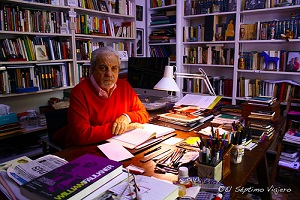
Juan Marsé (Barcelona, 8 januari 1933)
De Duitse schrijfster Waldtraut Lewin werd geboren op 8 januari 1937 in Wernigerode. Zie ook alle tags voor Waldtraut Lewin op dit blog.
Uit: Goethe
»Eure Wehen waren zu schwach, Madame, das Kind hat zu lange gebraucht – es bekommt keine Luft in die Lungen!«
»Bemühe Sie sich weiter, um Himmels willen!«
»Warmen Wein!«, ordnet Margarethe Textor an. »Schnell, hinein mit dem Kind. Und eine Herzmassage!«
Da ihr die Hebamme zu langsam und zu ungeschickt vorgeht, greift sie selbst mit zu.
»Gnädige Frau Rätin, lasst einen Priester kommen! Ich werde dem Kind die Nottaufe geben und …«
»Nichts ist mit Nottaufe! Wenn wir überhaupt jemanden holen, so ist es ein Arzt!«
»Das Kind ist tot!«
»Versteht Ihr Euer Handwerk so schlecht, Müllern, oder was ist los? Bemüht Euch!«
Anna Textor nimmt sich jetzt selbst des blassen Knaben an, drückt ihren Mund auf den seinen, bläst ihm Atem ein, packt ihn bei den Beinen, schüttelt ihn. Schon will sie aufgeben, da sagt die alte Frau Goethe leise: »Aber sieh doch, er atmet ja!«
Ein erster Atemzug hebt die Brust des Kindes. Und dann – der erste quäkende Schrei.
»Rätin, er lebt!« Die Hebamme ist in Tränen aufgelöst. »Das Kind lebt. Ein Wunder des Herrn!«
Elisabeth lässt sich in den hohen Kissenberg zurücksinken, gegen den sie sich bei der Entbindung, halb sitzend, gelehnt hatte. »Bringt ihn mir«, sagt sie schwach. »Bringt mir den Kleinen. Johann Wolfgang. Nach meinem Vater.«
Ihre Mutter mustert die Hebamme mit ihren schwarzen Augen. Es ist kein freundlicher Blick. »Pfuscherin«, murmelt sie vor sich hin.“
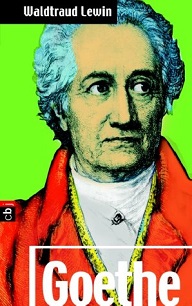
Waldtraut Lewin (Wernigerode, 8 januari 1937)
Cover
De Franstalige, Canadese dichter, schrijver en uitgever Gaston Miron werd geboren op 8 januari 1928 in Sainte-Agathe-des-Monts. Zie ook alle tags voor Gaston Miron op dit blog.
Jeune fille
Jeune fille plus belle que toutes nos légendes
de retour à la maison que protègent les mères
secrète et enjouée parmi les êtres de l'été
elle aimait bien celui qui cache son visage
sur mon corps il ne reste que bruine d'amour
au loin les songes se rassemblent à sa taille
pour les bouquets d'eau de ses yeux trop beaux
les yeux qu'elle a lui font trop mal à l'âme
jeune fille plus perdue que toute la neige
les ans s'encordent sur mes longueurs de solitude
et toujours à l'orée de ta distance lointaine
tes mille essaims de sourires encore m'escortent
j'en parle à cause d'un village de montagnes
d'où s'envolent des rubans de route fragiles
toi et moi nous y fûmes plusieurs fois la vie
avec les bonheurs qui d'habitude arrivent
je parle de ces choses qui nous furent volées
mais les voudra la mort plus que l'ombre légère
nous serons tous deux allongés comme un couple
enfin heureux dans la mémoire de mes poèmes
Ma désolée sereine
Ma désolée sereine
ma barricadée lointaine
ma poésie les yeux brûlés
tous les matins tu te lèves à cinq heures et demie
dans ma ville et les autres
avec nous par la main d'exister
tu es la reconnue de notre lancinance
ma méconnue à la cime
tu nous coules d'un monde à l'autre
toi aussi tu es une amante avec des bras
non n'aie pas peur petite avec nous
nous te protégeons dans nos puretés fangeuses
avec nos corps revendiqués beaux
et t'aime Olivier
l'ami des jours qu'il nous faut espérer
et même après le temps de l'amer
quand tout ne sera que mémento à la lisière des ciels
tu renaîtras toi petite
parmi les cendres
le long des gares nouvelles
dans notre petit destin
ma poésie le coeur heurté
ma poésie de cailloux chahutés
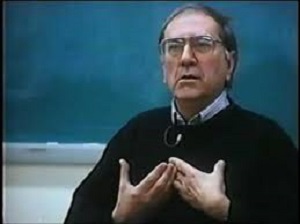
Gaston Miron (8 januari 1928 – 14 december 1996)
De Italiaanse schrijver en politicus Leonardo Sciascia werd geboren in Racalmuto, Agrigento op 8 januari 1921. Zie ook alle tags voor Leonardo Sciascia op dit blog.
Uit: A Simple Story (Vertaald door Howard Curtis)
“[St. Joseph the carpenter], who seemed to have inspired the bonfires of old furniture which were lit in the working-class neighborhoods almost as a promise to the few carpenters still in business that there would be no lack of work for them. The offices were almost deserted, even more so than on other evenings at that hour, but they were still lit, the way the offices of the police were usually kept lit in the evening and during the night, by tacit agreement, to give the townspeople the impression that the police were ever alert to the safety of the public."
(…)
"But as the commissioner's attitude had annoyed him, and as he was almost entirely devoid of what is usually called esprit de corps — which meant regarding the body to which he belonged as the most important thing of all, considering it infallible, or, if it was not infallible, untouchable, overwhelmingly right, especially when it was wrong — he had a mischievous idea."

Leonardo Sciascia (8 januari 1921 - 20 november 1989)
De Engelse dichter, vertaler en graficus Alfred Charles Tomlinson werd geboren op 8 januari 1927 in Stoke-on-Trent, Staffordshire. Zie ook alle tags voor Alfred Tomlinson op dit blog.
Skywriting
Three jets are streaking west:
Trails are beginning to fray already:
The third, the last set out,
Climbs parallel a March sky
Paying out a ruled white line:
Skywriting like an incision,
Such surgical precision defines
The mile between it and the others
Who have disappeared leaving behind
Only their now ghostly tracks
That still hold to the height and map
Their direction with a failing clarity:
The sky is higher for their passing
Where the third plane scans its breadth.
The mere bare blue would never have shown
That vaultlike curvature overhead,
Already evading the mathematics of the spot,
As it blooms back, a cool canopy,
A celestial meadow, needing no measure
But a reconnaissant eye, an ear
Aware suddenly that as they passed
No sound accompanied arrival or vanishing
So high were their flight-paths on a sky
That has gone on expunging them since,
Leaving a clean page there for chance
To spread wide its unravelling hieroglyphs.
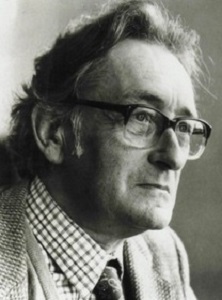
Alfred Tomlinson (Stoke-on-Trent, 8 januari 1927)
De Oekraïense dichter en schrijver Vasyl Stus werd geboren op 8 januari 1938 in Rakhnivka, in de provincie Vinnytsia Oblast. Zie ook alle tags voor Vasyl Stus op dit blog.
Untitled
I cross the edge. This conquering the circle,
this forward motion of a foot,
this lived experience, this naked emptiness,
this salty water, like an oily sludge,
this hopelessness of first beginning,
they terrify me! Better to
forget
this land of hesitation, and to extinguish the flame
and embers from memory. I cross the edge.
As leopards leap through burning rings
carrying the impulse of bewildered souls,
So you must aim at the center of death’s eye,
And be reborn in death. Do not disturb
the old despondency. Begin beyond it,
well past the barrow, out there on the brink,
Where sacred tablets
seemingly appear,
(but do not mention them to others).
Where the sea of humanity swims and step by step
a proud continent grows out into
the sea,
like an ossified mirror of eternity,
like a prophetic word or a prophetic scream.
Go, cross the edge! Your birth will follow death.
Strive headlong for the path,
as bright as blood,
That favors honest and repentant souls
who live as such,
expecting in their end
a new beginning. Yearning for the stars
as adversity spreads its wings and turns its energy toward
eternity.
Vertaald door Artem Pulemotov
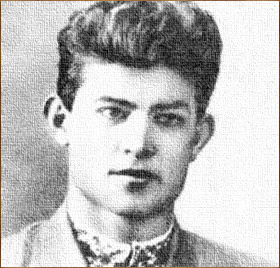
Vasyl Stus (8 januari 1938 – 4 september 1985)
Zie voor nog meer schrijvers van de 8e januari ook mijn blog van 8 januari 2014 en ook mijn blog van 8 januari 2011 deel 1 en eveneens deel 2.
|



